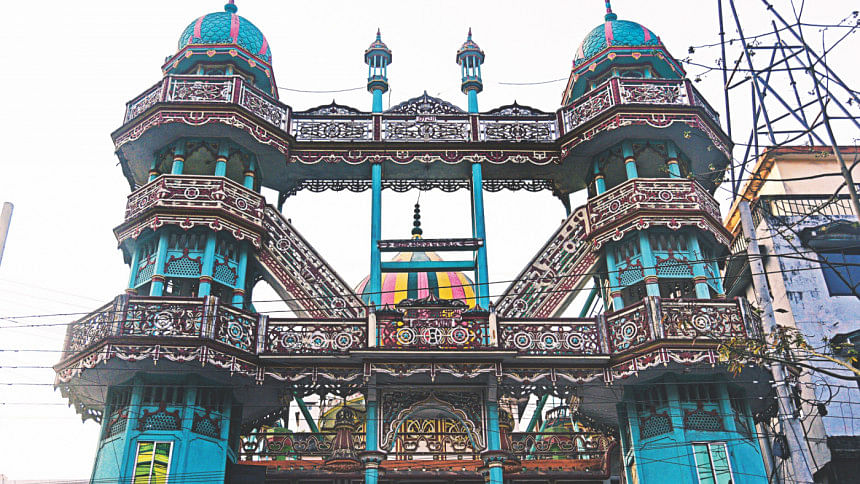Chandanpura Mosque: A sight to behold


Despite the hustle and bustle of ever-busy Nawab Siraj ud-Daulah Road in port city, a structure with multiple domes and soaring minarets painted in bright colours compels a passer-by to halt and behold its beauty and majesty.
Situated in the old part of Chattogram, Chandanpura Mosque is one of the most famous landmarks in the city as well as a popular tourist attraction for its impressive architecture.
With its spacious interior, slender columns, elongated buttresses and intricately designed balusters, Masjid-e-Siraj ud-Daulah, locally known as Chandanpura Jame Masjid, is one of the great examples of Mughal-inspired architecture.
According to historians, it was built in 1870 by one Master Abdul Hamid, a contractor. After its construction, the mosque used to be known as Hamidia-Taj-Masjid. Builders and architects from Lucknow and Mumbai (of India) were brought in for the work.
Later in 1947, Abu Syed Dobhash, a descendant of Hamid, took the initiative to renovate the mosque, which was completed in 1952. It had cost around Tk 4 lakh for the renovation.
At present, a committee formed by descendants of Dobhash looks after the mosque.
The two-storey structure with an entrance in the middle has two staircases zigzagging to the top of two minarets on both sides. Railings of the staircases are decorated with multi-coloured floral designs. Both minarets are around seven-storey tall.
In total, there are five domes with a large onion dome at the centre -- surrounded by structures intricately designed like petals.
“Chandanpura mosque stands out for its delicate ornamentation,” said architect Kuheli Chowdhury.
The teacher of Premier University, Chattogram added, “The massive vaulted-gate was constructed not only as an entrance, but also to welcome all. Alongside being a prayer hall, this mosque offered people a place to unwind.”
She said the major attraction of the structure are the minarets. “They were constructed in such a way that sunlight can enter the floors easily.” While visiting the place, people often get mesmerised by this “hide and seek” between sunlight and shadows, she added.
The mosque is located between Andarkilla and Chawkbazar intersections -- two densely-populated areas in the city. Locals worry that rapid urban sprawl may eventually have a negative impact on the area, especially the structure.
“This mosque is a part of our identity. It never ceases to amaze us even after so many years. Before, we could see it from afar. But the surrounding is not the same anymore. The area is suffering from unplanned urbanisation,” said Safayet Adib, a banker by profession.
Many nearby buildings are also blocking the view, said locals.
During a recent visit, this correspondent also saw several multi-storied buildings were being constructed in the area while heavy vehicles plying the adjacent roads throughout the day.
Architect Kuheli said when heavy vehicles continue to ply the road next to the mosque, its columns vibrate. Base of the structure may become unstable due to that, she said.
“In order to preserve the mosque, it is necessary to ban movement of heavy vehicles on the road or if needed shift it elsewhere. Otherwise, it will be difficult to preserve the mosque, despite all the maintenance works,” she said.

 For all latest news, follow The Daily Star's Google News channel.
For all latest news, follow The Daily Star's Google News channel. 



Comments